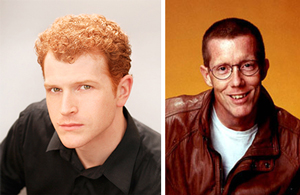by Guytano Parks

Partnering masterfully with Warren Jones, Musical America’s “Collaborative Pianist of the Year” for 2010, Garland took us on the quest via music by Vaughan Williams, Schubert, Gabriela Lena Frank, Ravel, Steven Mark Kohn and Leigh-Darion. Vaughan Williams’s Songs of Travel, based on poems by Robert Louis Stevenson, opened the program. The first of the nine songs, “The Vagabond”, marched along deliberately and found the team pausing slightly on the last beat of certain measures, effectively emphasizing the poetry.
Garland delivered the text with beautiful, clear diction, resonant tone and elegant phrasing, while Jones produced an exquisite array of tone colors, textures and dynamics on the piano. Lovely rustlings ebbed and flowed in “Let Beauty Awake” with perfectly matched echoing of phrases. “The Roadside Fire” was rhythmically exciting and “Youth and Love” was delivered simply with musical insight, control of sustained phrases, and fine management of changes between vocal registers.
“In Dreams”featured remarkable pianissimo effects and impassioned outbursts, and “The Infinite Shining Heavens”benefitted from Garland’s punctuated delivery. A sense of urgency pervaded the poignantly bittersweet “Whither Must I Wander”,and “Bright is the Ring of Words” found the two artists breathing as one through phrases contrasting between the robust and the tender. The opening march appeared again in “I Have Trod the Upward and the Downward Slope”, and at the end, the piano gradually faded away, concluding the cycle in peaceful resignation.
Threesongs by Schubert followed. The first, Der Wanderer, was dark in color and intense in character. A driving pulse at the onset with a soaring, lighter middle section distinguished An Schwager Kronos, and Der Musensohn was exciting with playful triplet patterns in the piano accompaniment. Garland’s diction was just as clear in German as in English, and he revealed fine and sensitive interpretive skills in these gems of the vocal literature.
After intermission came Gabriela Lena Frank’s “El nacimientode Cifar” and “Eufemia” from Cantos de Cifar y el mar dulcet, based on little-known, unpublished poems by Pablo Antonio Cuadra. These songs utilize traditional Nicaraguan vocal practices and recount the odyssey of a harp-playing mariner, Cifar, including his sailing in a storm with raging waves, wind and rain, and the horror of witnessing a casket with a dead baby inside floating by.
Lush chords with juxtapositions of staccato repeated notes and piquant harmonies pepper the piano part. Crescendos on sustained tones that were clipped off sharply at the ends, and spoken sections full of expressive and declamatory sounds in the vocal part — all quite astonishing and projected powerfully by Garland — made for a highly evocative and dramatic experience. It was both fascinating and mesmerizing.
Ravel’s set of three songs, Don Quichotte a Dulcinée, brimming with Spanish flair, sounded exotic and suave, and as both artists performed them with nuance and subtlety. “Chanson Romanesque” featured spicy, dissonant harmonies and “Chanson epique” was prayer-like with sustained legato phrases. “Chanson à boire” was delightful as Garland relished in his portrayal of a drunkard, complete with twittering, bombast and a concluding stumble.
Ten Thousand Miles Away, Wanderin’ and Poor Wayfaring Stranger, three American folk songs arranged by Cleveland Institute of Music faculty member Steve Mark Kohn, followed. The piano gently shimmered as lovely and colorful harmonic changes undulated beneath the vocal line. The composer’s expressive use of dissonance and dramatic pauses are thoughtfully placed, and the performers’ observance of such details made for a reflective and nostalgic reading.
The quest ended with an impassioned performance of “To Dream the Impossible Dream” from Man of La Mancha by Mitch Leigh & Joe Darion. As an encore, the audience was treated to a rollicking “Way Out West (On West End Avenue)” from Babes In Arms by Rodgers and Hart. Garland (quite the actor as well as singer) played endearingly dumb, swaggering and kicking his heels up in dance, and Jones yelled out the final Yippee-aye-ay!
Published on ClevelandClassical.com May 27, 2014.
Click here for a printable copy of this article.


